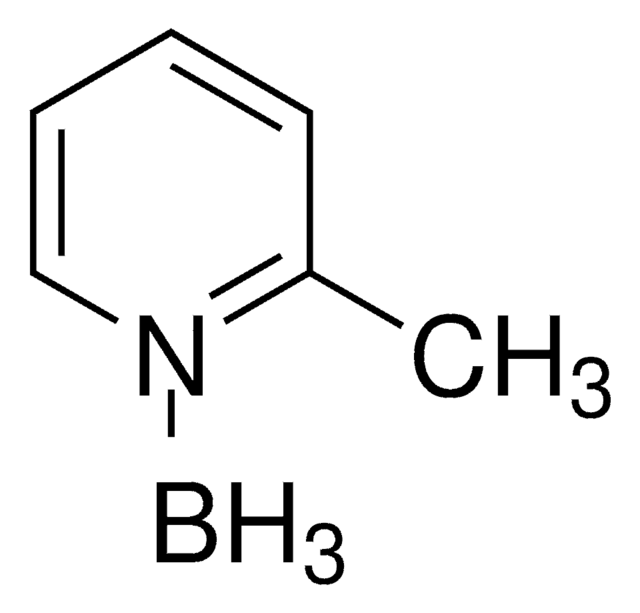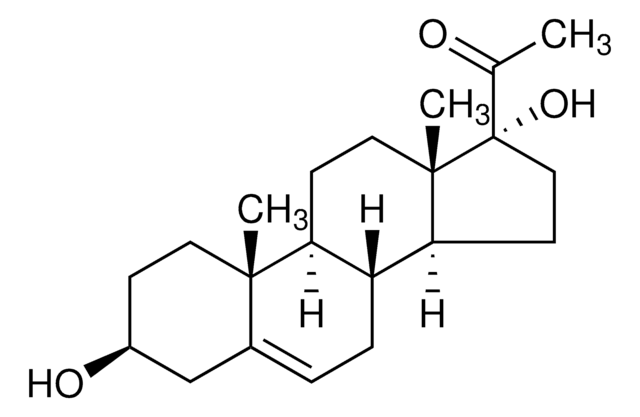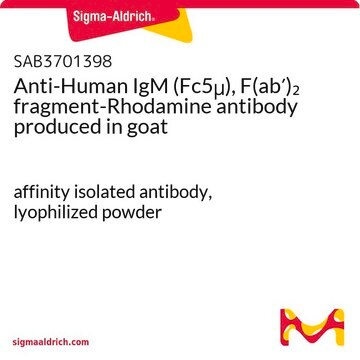C4187
Cyanoborohydride Coupling Buffer
Sinónimos:
Coupling buffer
Iniciar sesiónpara Ver la Fijación de precios por contrato y de la organización
About This Item
Código UNSPSC:
12161700
NACRES:
NA.56
Productos recomendados
Formulario
liquid
Nivel de calidad
idoneidad de la reacción
reagent type: reductant
técnicas
affinity chromatography: suitable
aplicaciones
life science and biopharma
temp. de almacenamiento
2-8°C
Aplicación
A ready-to-use reagent used to couple amine ligands to aldehyde functional groups. The coupling buffer reaction is a reductive amination of the intermediate Schiff′s base to a stable C−N bond.
Cyanoborohydride Coupling Buffer has been used:
- in coupling reactions between amines and glutaraldehyde
- to reduce hydrazone bond to a stable hydrazide bond
- as a component in oligonucleotide reaction mixture for coverslips functionalization
Cyanoborohydride Coupling Buffer is used in affinity chromatography, protein chromatography, activated/functionalized matrices and synthetic reagents. Cyanoborohydride has been used to inform a safe and effective gene-transfer system targeting hepatocytes as well as to develop a method for targeted delivery of anticancer therapeutics to cancer cells in hypoxic areas.
Acciones bioquímicas o fisiológicas
Cyanoborohydride Coupling Buffer is a reagent suitable for reductive amination processes, that contributes to transformation of simple alcohols into more complex amines. It is used in the conversion of Schiff base, by reducing it, to form a secondary amine without affecting aldehyde groups on the support.
Componentes
0.02 M sodium phosphate, pH 7.5, containing 0.2 M sodium chloride and 3.0 g/L sodium cyanoborohydride
Palabra de señalización
Warning
Frases de peligro
Consejos de prudencia
Clasificaciones de peligro
Acute Tox. 4 Oral - Aquatic Chronic 2
Código de clase de almacenamiento
12 - Non Combustible Liquids
Clase de riesgo para el agua (WGK)
WGK 3
Punto de inflamabilidad (°F)
Not applicable
Punto de inflamabilidad (°C)
Not applicable
Elija entre una de las versiones más recientes:
¿Ya tiene este producto?
Encuentre la documentación para los productos que ha comprado recientemente en la Biblioteca de documentos.
Use of polymer supported reagents for clean multi-step organic synthesis: preparation of amines and amine derivatives from alcohols for use in compound library generation
Ley S, et al.
Journal of the Chemical Society. Perkin Transactions 1, 15(27), 2239-2242 (1998)
Christopher A Holden et al.
International journal of nanomedicine, 5, 25-36 (2010-02-18)
Tumors frequently contain hypoxic regions that result from a shortage of oxygen due to poorly organized tumor vasculature. Cancer cells in these areas are resistant to radiation- and chemotherapy, limiting the treatment efficacy. Macrophages have inherent hypoxia-targeting ability and hold
Direct electrical detection of antigen?antibody binding on diamond and silicon substrates using electrical impedance spectroscopy.
Yang W, et al.
Analyst, 132(4), 296-306 (2007)
Binding between the integrin ?X?2 (CD11c/CD18) and heparin.
Vorup-Jensen T, et al.
Test, 282(42), 30869-30877 (2007)
Polymer-supported triacetoxyborohydride: a novel reagent of choice for reductive amination
Bhattacharyya S, et al.
Tetrahedron Letters, 44(27), 4957-4960 (2003)
Nuestro equipo de científicos tiene experiencia en todas las áreas de investigación: Ciencias de la vida, Ciencia de los materiales, Síntesis química, Cromatografía, Analítica y muchas otras.
Póngase en contacto con el Servicio técnico








